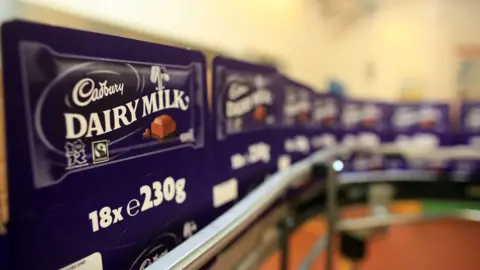Cadbury loses legal battle over purple wrapper
 Getty Images
Getty ImagesCadbury has lost more ground in its long-running battle to protect the particular purple it uses to wrap its chocolate.
After losing an appeal last month, Cadbury has given up a trademark.
Lawyers said the company may have decided the trademark application is unenforceable after a court ruled it was too wide-ranging.
The move makes it harder for Cadbury to stop a rival from using a similar colour for its products, a lawyer said.
In 2012 Cadbury won a case to stop other chocolate firms using the colour - known as Pantone 2865c.
Nestle challenged that, and in 2013 won an appeal.
The Court of Appeal said at the time the trademark application lacked "the required clarity, precision, self-containment, durability and objectivity to qualify for registration".
'Very strict'
Cadbury's original trademark application aimed to protect the colour "applied to the whole visible surface, or being the predominant colour" of the wrappers on bars and tablets of chocolate.
It is the "predominant" part that is seen as the problem, Rebecca Anderson-Smith, a trade mark attorney at Mewburn Ellis in Bristol, told the BBC.
"I think the courts and trademark offices are very strict with colour trademarks," she said. "They don't want to give anyone a monopoly on the colour purple."
It will now be "harder for Cadbury to stop a third party from using a similar colour," she said.
Cadbury's most recent move was to claim the trade mark had two parts and then remove the part that was about predominant colour.
This failed in December. And the company then dropped a 1995 trademark with similar wording, probably realising it was unenforceable, she said.
Brand defence
Will we be seeing rivals pounce and sell chocolates with a similar colour?
"We have not appealed but will continue to protect what we believe is a distinctive trademark," Cadbury's US owner Mondelez, said.
Cadbury does have at least one more trademark from 2004, said Ms Anderson-Smith, although it uses similar wording.
Finally, the company could argue that it has unregistered trademark rights.
Those protect customers from being confused by firms that deliberately make products that look similar to established brands.
But this would be a much harder thing to enforce, Ms Anderson-Smith said, since extensive use of the trade mark must be proved.
